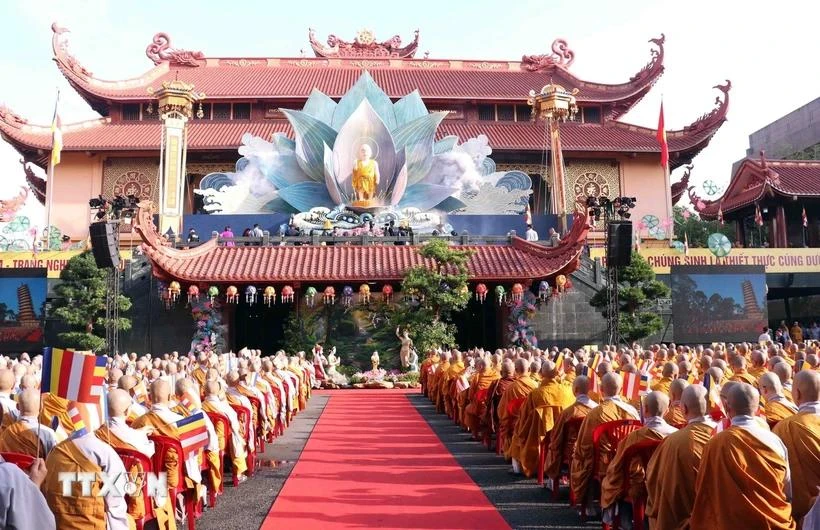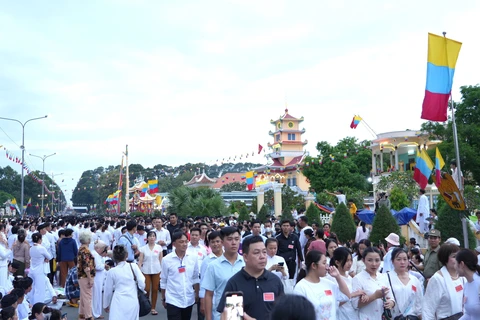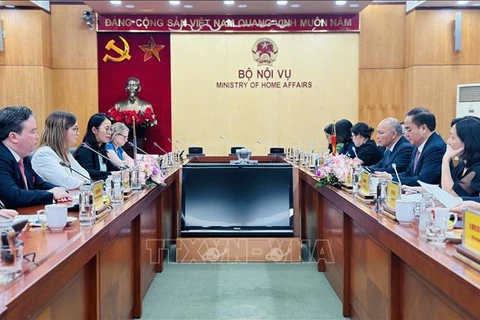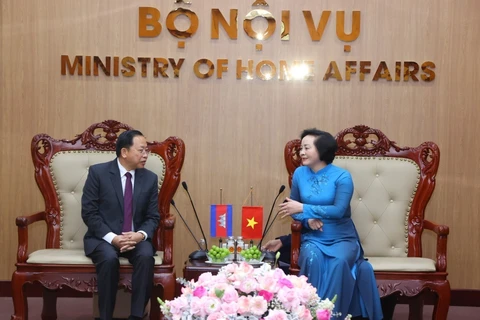
Hanoi (VNA) – Vietnam has reached numerous achievements in all aspects of society and business, with its role and stature praised by the United Nations and the international community. However, some foreign organisations and hostile forces continue to spread wrongful reports and misinformation about religious freedom in the country.
To clarify this issue, Dr Tran Thi Hong Le from the Institute of Human Rights at the Ho Chi Minh National Academy of Politics has written an article affirming that to meet people’s legitimate spiritual needs, the State of Vietnam has built a system of policies and laws to ensure the right to practice religion that meets international standards on human rights, generating considerable spiritual benefits for society.
Freedom of belief, religion – fundamental human right, fundamental right in Vietnam
In Vietnam, two years ahead of the Universal Declaration of Human Rights, 19 years ahead of the International Convention on the Elimination of All Forms of Racial Discrimination, and 20 years ahead of the two 1966 treaties on fundamental human rights, the 1946 Constitution of Vietnam stated in Article 10, Chapter 2 - Citizens' obligations and rights: "Vietnamese citizens have the right to freedom of belief." The 1959 Constitution (in Article 26) and the 1980 Constitution (in Article 68) continued to state that citizens have the right to "freedom of belief, to follow or not to follow any religion."
The 1992 Constitution reaffirmed this right and added the recognition of religions’ right to equality before the law. It declared the protection of places of worship of beliefs and religions. It also prohibits the infringement of freedom of belief and religion or taking advantage of belief and religion to violate the law and policies of the State (Article 70).
The 1946, 1959, 1980, and 1992 Constitutions recognised human rights – including the freedom of belief and religion – in the name of citizenship rights. There has never been a case in Vietnam in which the freedom of belief and religion is restricted because one is not a Vietnamese citizen.

The 2013 Constitution clearly distinguishes the two concepts of human rights and citizenship rights. It recognises the right to freedom of belief and religion as a human right with its universality: “Everyone has the right to freedom of belief and religion, to follow or not to follow any religion. Religions are equal before the law” (Clause 1, Article 24). Moreover, the 2013 Constitution expands the scope of the State's obligations, which are not only to protect places of worship of beliefs and religions as enshrined in the 1992 Constitution but also to “respect and protect the right to freedom of belief and religion.” The objects of protection include the right to freedom of following or not following a belief or religion, belief and religious activities, religious organisations, along with belief and religious establishments (places of worship).
Regarding the prevention of violations of laws or exploitation of freedom of belief and religion, the 2013 Constitution inherits the 1992 Constitution and states: “No one shall violate freedom of belief and religion or take advantage of belief and religion to violate the law.” (Clause 3, Article 24).
Legal regulations guarantee freedom of belief, religion in Vietnam
Institutionalising the right to freedom of belief and religion recognised by the 2013 Constitution, the National Assembly promulgated the 2016 Law on Belief and Religion. While the Constitution is the root, the Law on Belief and Religion is the pillar of the legal system on ensuring the right to freedom of belief and religion in Vietnam. This law stipulates the right to freedom of belief and religion; belief activities, religious activities; religious organisations; and rights and obligations of agencies, organisations, and individuals related to belief and religious activities.
The 2016 Law on Belief and Religion, together with related documents built on the spirit of the 2013 Constitution, has created a tight legal framework to respect and ensure the practice of the right to freedom of belief and religion in Vietnam.
Based on the Constitution, the 2016 Law on Belief and Religion reaffirms the universality of the right: “Everyone has the right to freedom of belief and religion” (Clause 1, Article 6). The subjects of specific rights related to freedom of belief and religion in Article 6 of this law are referred to by the terms “everyone”, “each person”, expressing equal recognition for all individuals, without any discrimination. However, for some groups at risk of discrimination or having their freedom of belief and religion restricted, the Law on Belief and Religion and other related documents provide specific regulations to ensure their freedom of belief and religion. The Law on Belief and Religion also includes articles on this right for prisoners and foreigners. Meanwhile, Article 22 of the 2014 Law on Marriage and Family, and Article 19 of the 2018 Law on Children also stipulate this issue for the groups these laws cover.
The presence of such specific regulations aims to ensure the right of freedom of belief and religion is a right for everyone, without exception, and everyone is equal in exercising the right to freedom of belief and religion.

Freedom of belief and religion is a right of every individual. However, religious activities are systematic and organised activities associated with religious organisations, so ensuring individuals’ right to freedom of religion must include ensuring the right to operate of religious organisations.
The existence and operation of organisations of different religions in Vietnam are guaranteed on the principle of "all religions are equal before the law" (Clause 1, Article 24 of the 2013 Constitution).
Regarding the State’s obligation, Article 14 of the 2013 Constitution establishes the State's obligation to recognise, respect, protect, and ensure human rights and citizenship rights by the Constitution and laws. The 2016 Law on Belief and Religion further defines the State's responsibility in Article 3 – the State is responsible for not only protecting the freedom of belief and religion of individuals but also for protecting the spiritual values and organisation, infrastructure, and assets of religious establishments, along with religious establishments and organisations.
Practice of ensuring freedom of belief, religion in Vietnam
Vietnam is an ethnically and religiously diverse country, but throughout its history, there have been no religious conflicts. Religious followers, non-believers, and followers of different beliefs and religions live together and in harmony across the country’s territory.
According to the White Book on Religions released by the Government’s Committee for Religious Affairs in early 2023, Vietnam has 16 religions with 36 religious organisations, and four organisations and one sect with certificates of registration for religious activities. The number of organisations recognised and granted registration is 43 as reported by the Ministry of Home Affairs in June 2024, increasing by two organisations.
The number of religious followers in Vietnam has increased rapidly in recent years. The 2019 Vietnam Population and Housing Census showed that the country had more than 13 million officially registered religious followers. But the 2023 White Book on Religion shows this figure is about 26.5 million, accounting for 27% of the population.
Aside from religions, most Vietnamese people, regardless of whether they live in the plains or mountains, urban or rural areas, believe in and practice one or several ethnic beliefs such as: the worship of ancestors, the worship of national heroes, and the worship of tutelary gods, goddesses and mother goddesses. The beliefs of the Mong, Dao, Ba Na, E De, Hoa, and Khmer ethnic people, among others, are also highly diverse, featuring both similarities and unique characteristics that contribute to the cultural diversity of the Vietnamese people.

Religious organisations in Vietnam have actively participated in socio-political life. In the 15th National Assembly, five religious dignitaries were elected as deputies; and 88 religious dignitaries, officers and 35 followers as deputies of the provincial-level People's Councils. There was a large number of others chosen as members of the People's Councils at the district and communal levels for the 2021-2026 term. Many are also members of the Vietnam Fatherland Front committees at all levels and have played an active part in various social associations and organisations.
Religious organisations have also brought into play their resources and taken part in social security activities, ranging from the fields of education, health to charity and social protection.
In addition, foreigners legally residing in Vietnam are provided with the opportunity to practice their religions with Vietnamese followers or gather in groups at locations licenced for religious activities.
According to the Government’s Committee for Religious Affairs, there are currently 67 places in Vietnam where foreigners legally residing in Vietnam practice their religions. Those groups are permitted to invite foreign dignitaries and monks to preach in Vietnam.
Along with ensuring the freedom of belief and religion, and the equality among beliefs and religions, Vietnam also ensures that the freedom is exercised based on the respect for important public interests protected by the Constitution and laws, and for the rights and legitimate interests of others.
Superstitious activities or acts of taking advantage of beliefs and religions for illegal profit, when discovered, will be strictly handled. Belief and religious activities that do not have negative content or purposes but affect security, safety and public health are also strictly prohibited.
In general, the freedom of belief and religion of Vietnamese people is exercised in line with the Constitution and laws, with respect for national interests, people’s interests, public interests, as well as the rights and legitimate interests of one another./.






















